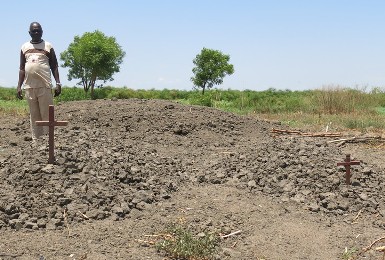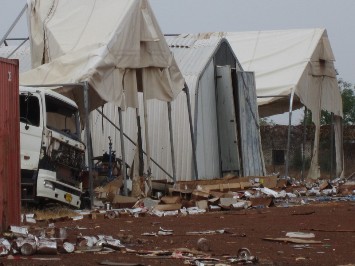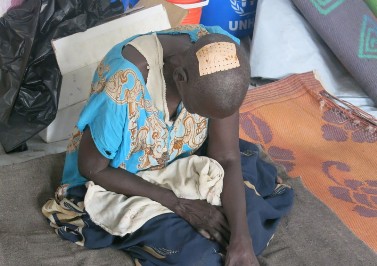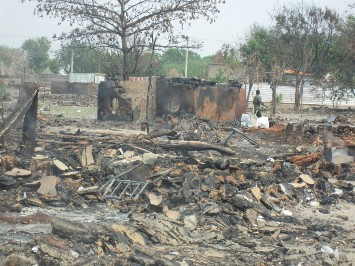Amnesty uncovers “horrific atrocities” in S. Sudan conflict
May 8, 2014 (JUBA) – An investigation by Amnesty International (AI) into the conflict in South Sudan has found both government and rebel forces are responsible for “horrific atrocities”, which constitute war crimes, saying civilians in the country are enduring “unimaginable suffering”.

The report comes as a coalition of South Sudanese, African and international NGOs appealed to member states of the UN Human Rights Council (UNHRC) to hold a special session on the deteriorating human rights situation in South Sudan.
It includes first-hand accounts from survivors of massacres, victims of sexual abuse and witnesses to the conflict.
Thousands of people have been killed and more than a million displaced since violence erupted in mid-December last year in the capital, Juba, with aid agencies warning of a looming humanitarian catastrophe as the country edges closer to famine.
Amnesty’s report, which was released on Thursday, says researchers found skeletons and decomposing bodies being eaten by dogs. They also uncovered dozens of mass graves, including five in Jonglei state capital Bor containing 530 bodies.
In a disturbing trend, it says civilians have been systematically targeted in places where they sought refuge, including inside their homes, churches, mosques, hospitals and UN compounds.
“This research reveals the unimaginable suffering of so many defenceless civilians unable to escape the growing spiral of violence in South Sudan,” said Michelle Kagari, AI’s deputy director for Africa.
“Civilians have been massacred in the very places where they sought refuge. Children and pregnant women have been raped and old and infirm people shot dead in their hospital beds,” she adds.
KEY RECOMMENDATIONS
Kagari said both sides had shown “total disregard for the most fundamental principles of international human rights and humanitarian law”, saying urgent measures were needed to curb the violence in the country and stop reprisals against civilians.

Amnesty also calls on all parties to the conflict to immediately cease human rights abuses, cooperate fully with independent and impartial investigations and take concrete steps to bring those responsible to justice.
“Those up and down the chain of command on both sides of the conflict who are responsible for perpetrating, ordering or acquiescing to such grave abuses, some which constitute war crimes and crimes against humanity, must be held accountable,” said Kagari.
Though triggered by a political dispute, the conflict has reignited decades old tribal tensions, pitting members of Kiir’s Dinka tribe against Nuer army defectors and their allied militias loyal to Machar.
Amnesty’s report, based on more than 100 interviews during field research undertaken in March, documents cases in which Dinka, Nuer and Shilluk civilians were deliberately targeted on the basis of their ethnicity.
In the early stages of the conflict, soldiers from the South Sudanese army (SPLA) allegedly conducted door to door searches in Juba, rounding up and killing hundreds of Nuer men, triggering a cycle of revenge attacks in other parts of the country.

Last month, more than 200 civilians were rounded up and killed while sheltering in a mosque in Unity state capital Bentiu after rebels retook the town, in what was one of the worst cases of ethnic violence since conflict erupted.
SHOCKING TESTIMONY
One survivor of a massacre described how he was rounded up by soldiers in Juba and held with at least 300 other men in overcrowded rooms inside an army barracks, where soldiers opened fire indiscriminately.
“Many people were killed in my room,” the man, who was one of 12 survivors, said. “Survivors lay among the dead, pretending to be also dead. The soldiers fired from the windows at anything that moved.”
In a separate incident, a woman described how her 20-year-old son and two other men were taken from her home in the Eden district of Juba by soldiers in the middle of the night on 16 December 2013 and shot.
“They (soldiers) took them outside and tied their hands behind their backs and then tied their feet with the same rope, so that their hands and feet were pulled together like sheep and they could not move. Then they shot them repeatedly,” she said.
The woman, who survived the attack after fleeing to a neighbour’s house, says she was among nine women later gang raped by soldiers.

The woman, who was three months pregnant at the time, said she was gang raped by nine men and later lost her baby as a result of the attack.
“If I had refused those people, they would have killed me,” she said.
The woman told researchers that seven women who resisted were violated with large wooden objects. All seven later died from their injuries.
NGOs APPEAL TO UNHRC
In a letter sent to the permanent representatives of members of the UNHRC on Thursday, 20 NGO groups appealed for the body to boost its engagement in the country.
They said a special session would allow the council to be briefed on the gravity of the ongoing crisis and decide on the most appropriate response.
“The dire and deteriorating situation in South Sudan cannot remain unaddressed and deserves the council’s immediate attention,” the NGOs said in the letter.
“The council can and must do more to prevent further serious human rights violations, war crimes and crimes against humanity in the country and to ensure that there is no impunity for the crimes already committed,” the letter adds.
(ST)
